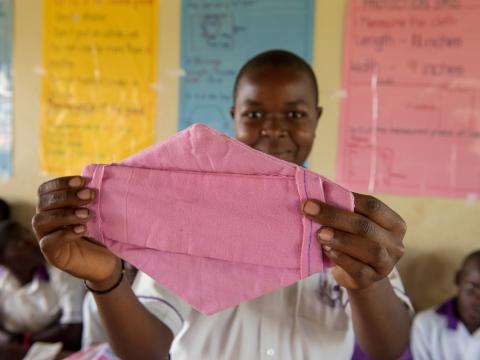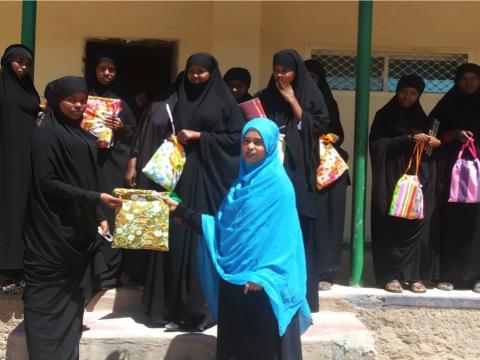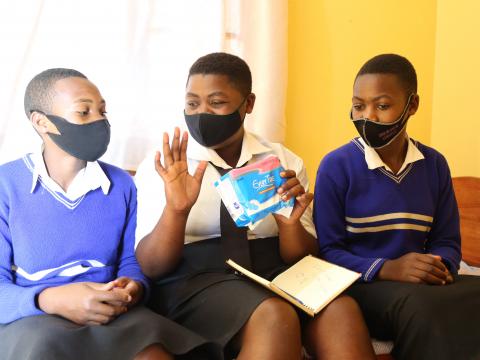
The Power of Periods
By Kristie Urich, WASH Knowledge Management and Capabilities Manager
What if a woman’s or girls’ ability to care for her menstrual health with dignity is not just an outcome we should aim for but also an indicator of whether she is truly empowered?
Since Women Deliver is focusing on the theme of power – how it both drives and hinders change – it’s time to consider the power of the period.
Menstrual health requires supportive social norms, policies, processes and products to be accessible and shame-free. For these to be in place, they must be established at a more systemic level, which will have an impact on more than just menstrual health. So, if we can find a way to measure whether women and girls truly can manage their menstrual health with dignity, could that be an indicator of empowerment? That would mean that menstrual health isn’t just an outcome in and of itself. It is a driver of empowerment.
We know menstrual health is a complex issue to address. It is not simply the provision of things – of toilets, menstrual hygiene products or clean water for cleansing. It is the provision of all those things together, plus so much more that is more difficult to achieve and measure – social norms, behaviour change, partnership, safety, equity, and more. We know that these are the essential ingredients not just to menstrual health but to human thriving, and that all of us – development actors, funders, government, the faith community, academia, the private sector and individuals – can bring part of the solution, but none of us brings it all.
In our early days of menstrual health programming at World Vision, we focused rather narrowly on WASH provisions for menstrual hygiene management –better sanitation facilities in schools and access to products. We know those are important pieces to the puzzle, but by no means all.
There are four emerging learnings as our menstrual health programming evolves.
Define your problem and ultimate impact: This may seem obvious, but it is amazing how often we don’t spend enough time defining and understanding the real problem we are trying to solve, which makes it difficult to identify the right goals and solutions. At World Vision, we have defined the simple but clarifying objective that we desire that our menstrual health programmes enable all women and girls to safely manage their menstrual health with dignity. It is much easier to work backward from there to find appropriate solutions.
Be curious, listen and respond: Listening is essential in all development programming, especially in areas as personal as menstrual health. We all, even women practitioners, need to check our biases and assumptions and listen to the women and girls we seek to serve and hear their hopes, fears, concerns, needs and solutions. We are working with our partners, Sesame Workshop, to develop a menstrual hygiene focused programme in Zimbabwe called WASH UP! Girl Talk. The development of the programme has included an extensive time of listening to stakeholders, educators and to girls themselves to develop materials aligned to the local context, and to receive feedback and adjust the programme for maximum impact.
Don’t neglect your influencers: In menstrual health, it is most obvious to target women and girls – menstruators themselves. Because our menstrual health programmes tend to be in schools, we also target teachers and school officials, and are learning the importance of engaging boys as well. However, poor menstrual hygiene practices are often rooted in deep-seated beliefs and social norms, and we must engage with the custodians of culture and custom in the community to address those foundational areas. In many cases, this includes the faith community, community leaders, grandmothers and other elder women. The government is, of course, a key influencer as well, as they foster a more fertile environment for access and sustainable change.
Iterate and learn: In the process of mapping out the problems and potential solutions in the area of menstrual health, we realized there are a lot potential effects and impacts – some tested, some untested. We know we can’t transform our menstrual health programming overnight to encompass all the areas of potential impact, but we can start with making small changes and improvements, gathering evidence, learning, and iterating as we move forward.
We are on a journey, as are many others, in defining and refining our approach to menstrual health. We celebrate and learn from the work of organisations and universities leading in this space, like Simavi, Splash, GIZ, Columbia University and WASH United. There is a growing community of passionate supporters of menstrual health, and we are learning together—with women and girls themselves – how to do this. It’s a long journey, and the only way to achieve it is through a series of small steps.
Learn more about our Menstrual Hygiene programming here.

